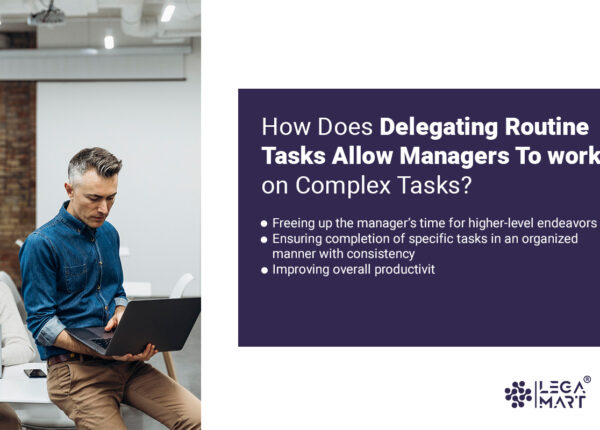Lawyers are ubiquitously known for their prolonged and burdensome schedules. The recently published 2022 Legal Trends Report by legal tech provider Clio underscores this issue, revealing that 86% of legal professionals are working beyond the conventional 9-to-6 hours. Moreover, the 2018 Legal Trends Report presented significant data, indicating that 75% of attorneys consistently operate outside regular business hours. As seen in Case Studies & Success Stories across the legal industry, this alarming trend contributes to 39% of these legal professionals acknowledging the adverse repercussions on their personal lives owing to such extended working periods.
One viable strategy to facilitate this prevailing issue is to effectively delegate more work to the support staff. By entrusting certain responsibilities to capable colleagues or utilizing legal support services, attorneys can reclaim some of their personal time, thereby mitigating the harmful effects of extended working hours on their overall well-being and personal lives.
Effective delegation is crucial to success as an effective leader in any business. By understanding how to delegate work and pass on tasks and projects to support staff, productivity will soar and give team members the opportunity for personal growth and more efficient management techniques. Let’s come together & investigate proven strategies of successful delegation that managers can use successfully!
Key Takeaways
- Understand the importance of delegating more work to support staff.
- Assess capabilities and set clear expectations for task completion.
- Provide adequate training, resources, feedback & recognition to foster growth & productivity.
Understanding the Need to Delegate More Work To Support Staff

Many managers have difficulties in delegating tasks due to anxiety of not retaining control or experiencing guilt about giving somebody else’s job to someone else. This job they think is mundane. Delegation skills are imperative for effective leadership, as they allow supervisors to allocate more time and effort to higher level objectives while allowing team members to develop their abilities and take on new obligations. Assigning work is a beneficial exercise that can maximise staff members’ output while aiding in professional growth. So, despite any reservations around delegation duties, this practice has advantages for both teams and individual employees.
Identifying Tasks Suitable for Delegation
For the team to maximize its productivity and growth, managers must identify which tasks are appropriate for delegation. Emphasis should be placed on mundane, lengthy or non-critical roles so that managerial duties can take precedence whilst also giving support staff an opportunity to be more productive.
An audit will enable the individual to analyze specific responsibilities, ascertain what best suits these capabilities, and optimize time allocation while prioritizing higher-priority objectives.
Routine tasks

Entrusting routine duties, such as data entry, direct reports, scheduling and email management, to support staff allows managers the capacity to focus on complex tasks. These repetitive activities usually involve standard techniques, processes or procedures – thus delegating them has its advantages:
- Freeing up the manager’s time for higher-level endeavors
- Ensuring completion of specific tasks in an organized manner with consistency
- Improving overall productivity
Time-consuming tasks
Delegating time-consuming duties to support personnel can lead to more responsibility, better management of time and more efficacy in the workplace. This approach gives managers greater capacity for concentrating on important tasks that require their competence and judgement while assuring that less tedious tasks and responsibilities are promptly addressed. It is an effective strategy for creating efficiency within the work environment and elevating productivity levels by cutting down unnecessary workloads from supervisors or executives.
Non-critical tasks
Essential tasks and objectives can be delegated to other team members, such as middle management or leaders. By doing so, managers are able to prioritize their work on more urgent matters while delegating operational activities or the organization of events (which do not affect the ultimate project deadline) to others.
This arrangement ensures greater productivity since essential duties receive proper consideration and effort from appropriate parties. Meanwhile, it allows supervisors with more freedom to concentrate on other tasks or areas of higher priority.
Assessing Support Staff Capabilities

To effectively delegate and assign tasks, managers should consider their staff’s capabilities and allocate duties in accordance with this. Considering individual work styles, current workloads and skill sets allow managers to delegate effectively and hand out responsibilities suitable for the employees’ capacities while affording them chances at growth.
Realizing what skillset each team member has equips bosses with the ability to appoint the job description roles that fit employee abilities while offering learning opportunities. Not only does this ensure designated jobs get done correctly, but it also encourages a culture of improvement through education within the team.
Setting Clear Expectations and Objectives
When assigning tasks, it is essential for managers to grant accountability, assign work, detail clear guidelines and present precise instructions. By clearly conveying the desired outcome and result, this guarantees that all delegated jobs are done precisely and quickly.
To clarify expectations, executives should also designate specific tasks with due dates and clear instructions regarding task completion and make available appropriate resources & power so their team can achieve success with these allotted assignments, which creates a positive atmosphere of faithfulness amongst members of the same team.
Providing Adequate Training and Resources
To make sure that delegated tasks are finished proficiently by support staff, managers should give suitable training and materials. This can include on-the-job instruction, availability of essential equipment or software programs required for the job, and Direction and mentorship from more experienced team members.
Supplying the necessary resources allows aid workers to do their jobs effectively while creating a positive atmosphere which promotes learning and progress towards attaining long-term success across all teams involved in this endeavour.
Establishing Open Communication Channels
Delegating tasks requires open communication to ensure successful completion while cultivating trust between team members. Managers should create clear channels of dialogue for the support staff, providing guidance and ensuring collaboration is achieved throughout all delegated task assignments. Inviting appropriate team members into the discussion is essential so that everyone feels empowered to express their concerns or challenges regarding what has been assigned to them. By doing this effectively, a healthy bond will form within each team member and with the specific task or delegation.
Monitoring Progress Without Micromanaging
When assigning duties, managers must maintain a careful balance between keeping track of development and avoiding micromanagement. This requires creating an atmosphere which endorses autonomy while also guiding as needed. As such, regular check-ins and progress updates should be established for team members to have what they need for the job. In addition to day-to-day activities, however, trust is essential amongst staff, with accountability necessary towards completing delegated work tasks expected from every member of the group.
Offering Constructive Feedback and Recognition
Managers should ensure that their support staff receive constructive feedback and recognition after they have completed the assigned tasks. This reinforces a culture of development and appreciation in the workplace, which can bring many advantages, such as heightened motivation among employees to take on new challenges with passion, improved performance levels leading to better job satisfaction, and increased productivity across all teams. Providing helpful criticism along with compliments will help facilitate these goals effectively.
Encouraging Skill Development and Growth
Assigning the right tasks according to the interests and talents of your support staff can give them chances to learn new skills. By giving tasks that require skillful execution, managers have a chance to cultivate an atmosphere conducive to continuous progress in their squad.
Providing opportunities like this has several advantages: practical task completion. Helping long-term success as part of the team. Improved morale due to feeling engaged and motivated workforce, which improves effectiveness through productivity improvement. Offering chances for acquiring fresh aptitudes and leadership skills is essential if you want these goals achieved.
Adapting Delegation Strategies Over Time
Managers need to assess and adjust their delegation strategies as they grow in experience so that progress can be made throughout the process of delegating tasks, which will help improve employee performance. Comprehending success stories along with difficulties allows leaders to refine their approaches regarding delegating tasks and enhance team productivity/output.
Regularly evaluating workers’ skillsets, setting definite objectives & expectations, and giving adequate instruction & materials needed while maintaining communication avenues open without micromanaging every move being made. Also, offering positive criticism plus recognition when due are all vital actions towards the performance reviews, improving efficiency through task distribution leadership skills, and aiding staff development by encouraging growth opportunities.
Summary
To achieve sustained success, efficient management must rely on effective delegation. This involves assigning suitable tasks per staff members’ capabilities while setting clear objectives and expectations, providing training resources and open communication lines for feedback and progress updates, and offering constructive advice alongside recognition when necessary to foster growth within the team. Such strategies are not static – they need continued adaptation and professional development over time so that their full potential can be realized by managers who can delegate tasks effectively and effectively.
Frequently Asked Questions
How can I delegate more effectively?
Delegating effectively requires being clear on desired outcomes, ensuring team and individual goals are met while giving the right authority for these and avoiding delegating tasks. Providing relevant resources as well as investing in training. There needs to be a focus on communication, feedback and prioritization of results when delegating work successfully.
What are the 5 principles for effective delegation?

When it comes to successful delegation, there are five key points. First, determine what tasks can be passed off. Second, define the desired outcomes clearly. Thirdly, ensure you have selected a suitable individual for the role; fourth, ensure that communication is concise and comprehensive throughout the delegation process; and finally, give authority where needed. As part of this procedure, also provide praise or feedback regularly to help motivate people involved in effective delegation activities.
What are the 3 elements of delegation?
Delegation is a process of allotting tasks, endowing power and creating accountability for the assigned responsibilities. These three components are critical to successful delegation. Assigning duty, entrusting authority to delegate responsibility as well, as making someone answerable all
How do you delegate to empower your employees?
Assign tasks to employee’s strengths, build your team and lay out specific expectations with the right tools. Give helpful feedback, welcome their input, share the goals of the team’s output organization, and honour them for their efforts to inspire staff members.
What types of tasks are suitable for delegation?
Non-essential tasks that are time-consuming can be assigned to team members, allowing them to prioritize essential matters and thereby optimize their efficiency. Such duties tackle tasks that involve repetitive processes and those that do not require immediate attention.




